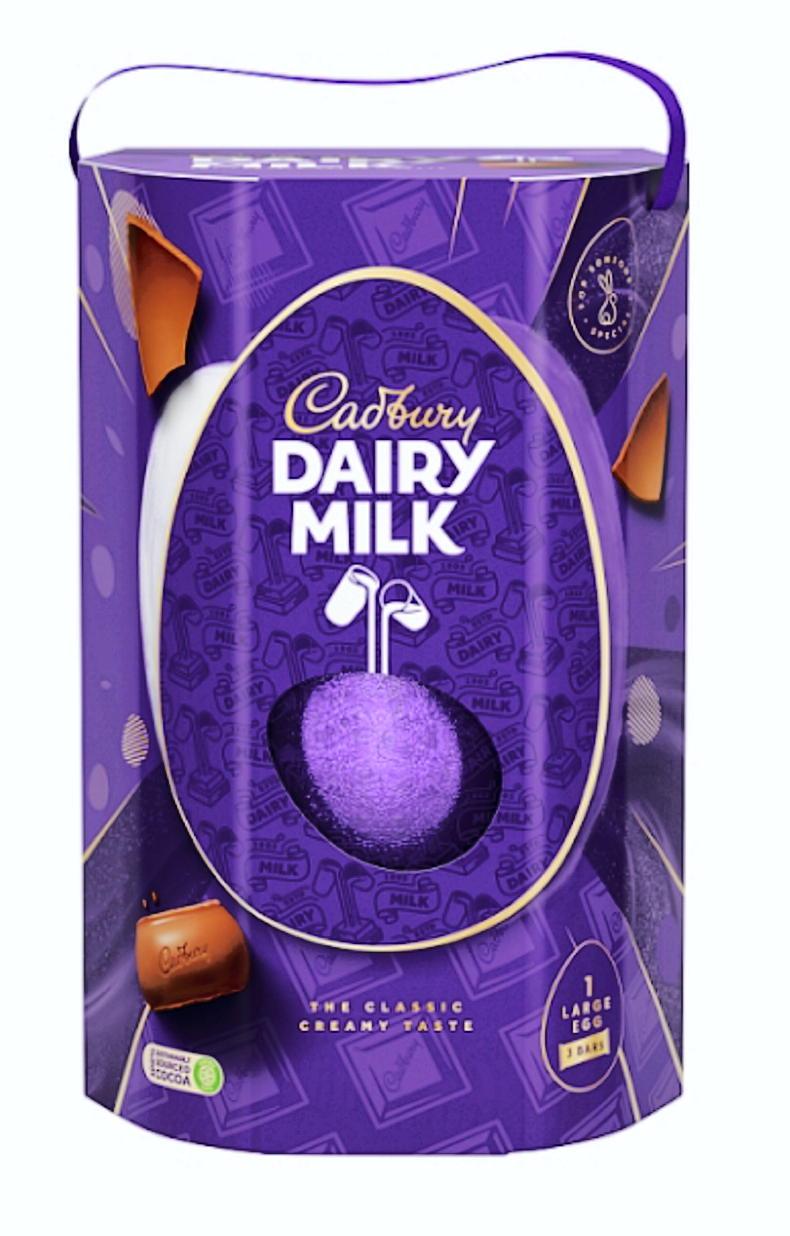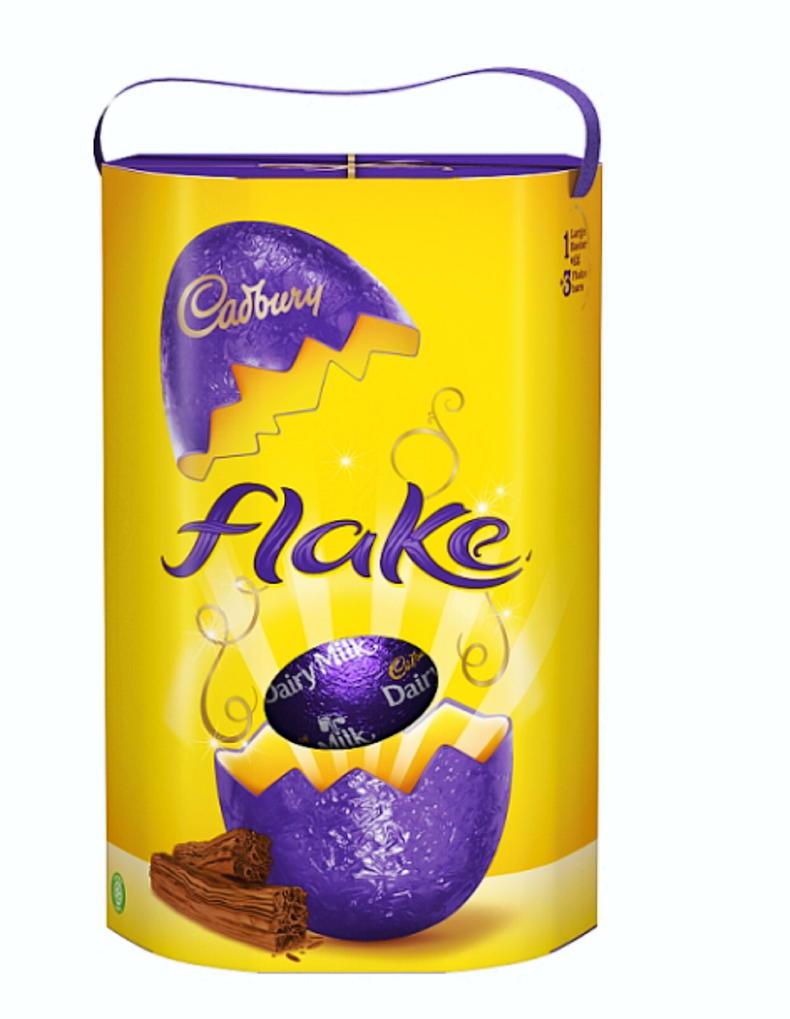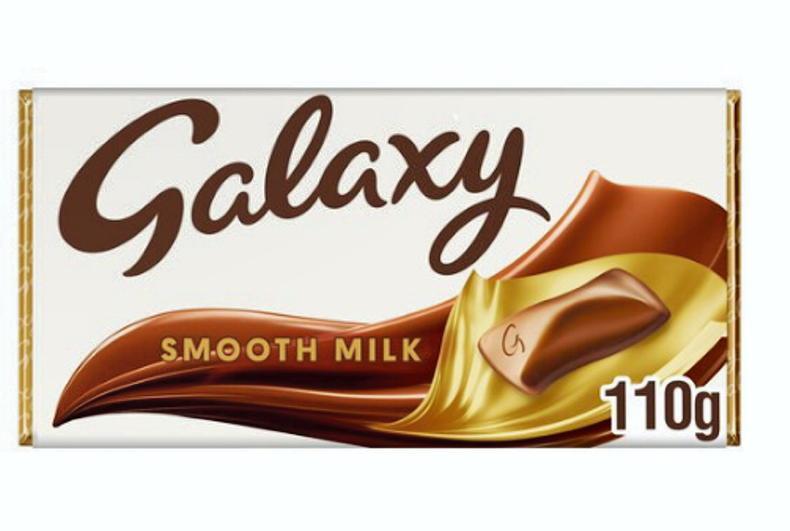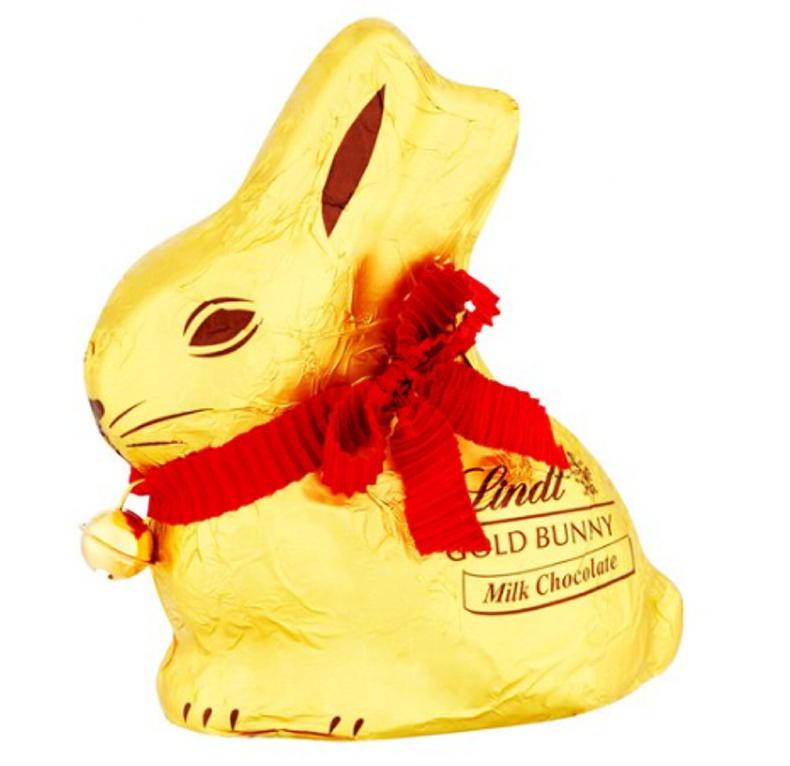Every year when I open that first Easter egg of the season, I unwrap the foil, delicately slow, mimicking Charlie and the Chocolate Factory. The drama of opening the egg may be part of tradition, but how much is that packing really costing you? In some situations, the chocolate is costing triple the amount of a bar of chocolate, meaning three quarters of the price is going on fancy wrappers.
Let’s break down the cost of that bar of chocolate.
Here in Irish Country Living, we took a sharing bar of Cadbury’s Dairy Milk chocolate, which was on special in Dunnes Stores for €2 (normally retails for around €3). Weighing in at 200g, it costs 1c/g of chocolate.

At €10 and weighing 286g, this Dairy Milk egg works out at 0.034c/g of chocolate, three times the amount of a standard bar.
Let’s put that same chocolate however, and purchase it in the form of an Easter egg. In SuperValu, we picked up the Dairy Milk Extra Large Easter Egg for €10. Weighing in at 286g, however, this worked out at 3.49c/g of chocolate, three times the price.

At €10 and weighing 247g, this Flake egg works out at 0.04c/g of chocolate, four times the amount of a standard bar.
And if you go for the similar-sized Flake Easter egg, that is going to cost you €10 for 249g of chocolate, working out as 4c/g, four times the price of your large Dairy Milk bar.
In fact, when looking for the best value for money, it pays to be mindful of the chocolate variety you choose. Let’s look at the giant Cadbury Easter eggs. SuperValu has priced its giant Dairy Milk Easter egg at €15. Weighing in at 515g, that costs 2.9c/g of chocolate.
However, if you were to opt for the giant Buttons egg, on closer inspection you’ll find that this one will cost you more. Because at 419g, this weighs in at nearly 100g less.
So it works out at 3.57c/g. It’s an easy mistake to make. They are both branded as the “giant” egg. They are both costing €15, but the Buttons one has less chocolate.
On offer
It’s worth looking out for special offers. Tesco also sells a large Cadbury Easter egg. The packaging is slightly different and this one is branded as “Extra Large” as opposed to “Giant”. But similar to the egg in SuperValu, it weights in exactly the same at 515g. This is on special offer, reduced from €16 (where it would have worked out as 3.1c/g) compared to the reduced price of €11, consequently 2.13c/g.
Where is the value?
However, the best value you’ll get on Easter eggs is by going small. The best deal we found was in Aldi where the small Cadbury Mini Eggs Easter egg worked out at 99c. Weighing in at 130g, the price per gram of chocolate worked out at 0.7c/g. This is exceptionally cheap, even cheaper per gram than your Dairy Milk bar. While Aldi worked out the cheapest, these small eggs can be found on special offer in all the retailers.

Small eggs represent the best value for money. In Aldi, the small Cadburys Mini Eggs Easter egg were 95c. Weighing in at 130g, the price per gram of chocolate worked out at 0.007c.
Tesco has a “3 for €3” offer, as does Lidl. Dunnes Stores is selling these same-sized eggs in a “3 for €5” while SuperValu has “4 for €4”.
Watch out if buying these eggs on their own though. The biggest mark-up was in SuperValu. Although the “4 for €4” means the egg works out at €1 each, if you are to buy it on its own, it’s €3 – three times the price.

Galaxy retails at €1.69 for a 110g sharing bar. Per gram of chocolate, this works out at 0.015c.
This leap in the price per gram of chocolate can be seen across many of the chocolate brands. Similarly, if you look at a bar of Galaxy chocolate, that retails at €1.69 for a 110g sharing bar. Per gram of chocolate, this works out at 1.5c.
However, compare that to the Galaxy Ripple extra large egg which works out at €9 in SuperValu. When broken down, that 286g egg is costing you 3.14c/g of chocolate – over double the amount per gram of the sharing bar.

A Galaxy Ripple extra large egg, which is €9 in SuperValu. When broken down, that 286g egg is costing you 0.031c/g of chocolate.
The Galaxy Enhanced Large egg also works out much more expensive. In SuperValu, we found it at €6, it weighs 206g, meaning that per gram of chocolate, you’re paying 2.9c – nearly double the amount of the bar. Again, watch out for special offers as we found the same egg for €3 in Tesco, meaning at that price, the price per gram is 1.46c, even cheaper than the chocolate bar.

Lindt chocolate bunnies work out as 0.03 c/g of chocolate when on special offer.
And what about those oh-so-cute Lindt chocolate bunnies? Those 100g little lads are coming in at €3.50 in Dunnes Stores and SuperValu (or two for €3) which works out as 3.5c/g (or 3c/g on the special offer). These come in cheaper than their Easter eggs, where all three sizes worked out as 4.6c/g of chocolate across the board.
Food for thought
Finally, the special offers are worth checking out but this does come back to a fairly grey area of consumer law. Currently the law states that if a retailer has an item on sale, it should have been listed at the higher price for a “reasonable amount of time”. Perhaps this is part of the reason why we’re seeing Easter eggs on supermarket shelves in February.
Easter egg
packaging:
what to recycle
From the outside in, that big box that holds the egg in place is most likely fully recyclable. Flat pack it and get it into the recycling bin.The rigid plastic circular hollow that holds the egg is also recyclable, but it’s an unnecessary piece of plastic so try to opt for brands that use cardboard placers to hold the egg in place which is a better environmental option. The aluminium foil is also fully recyclable but scrunch it up. If it is flattened, unfortunately, the material can’t be detected by the recycling machines.Chocolate trays and egg boxes are also fully recyclable.There are two main culprits when it comes to Easter egg packaging that can’t be recycled. First is those Easter eggs that are wrapped in cellophane. Ironically, because it doesn’t come in a box and the egg just sits on a little stand that is wrapped, you might think you are making an environmentally positive purchase but you’re going to have to throw all that wrapping straight into your black bin. The other non-recyclable piece of packaging is little bags that hold sweets. For example, if your Maltesers egg comes with a little bag of Maltesers, that bag won’t be recyclable and will need to go in the black bin. Read more
Easter eggs: sweet dreams are made of this
Unwrapping the impact of Easter
Every year when I open that first Easter egg of the season, I unwrap the foil, delicately slow, mimicking Charlie and the Chocolate Factory. The drama of opening the egg may be part of tradition, but how much is that packing really costing you? In some situations, the chocolate is costing triple the amount of a bar of chocolate, meaning three quarters of the price is going on fancy wrappers.
Let’s break down the cost of that bar of chocolate.
Here in Irish Country Living, we took a sharing bar of Cadbury’s Dairy Milk chocolate, which was on special in Dunnes Stores for €2 (normally retails for around €3). Weighing in at 200g, it costs 1c/g of chocolate.

At €10 and weighing 286g, this Dairy Milk egg works out at 0.034c/g of chocolate, three times the amount of a standard bar.
Let’s put that same chocolate however, and purchase it in the form of an Easter egg. In SuperValu, we picked up the Dairy Milk Extra Large Easter Egg for €10. Weighing in at 286g, however, this worked out at 3.49c/g of chocolate, three times the price.

At €10 and weighing 247g, this Flake egg works out at 0.04c/g of chocolate, four times the amount of a standard bar.
And if you go for the similar-sized Flake Easter egg, that is going to cost you €10 for 249g of chocolate, working out as 4c/g, four times the price of your large Dairy Milk bar.
In fact, when looking for the best value for money, it pays to be mindful of the chocolate variety you choose. Let’s look at the giant Cadbury Easter eggs. SuperValu has priced its giant Dairy Milk Easter egg at €15. Weighing in at 515g, that costs 2.9c/g of chocolate.
However, if you were to opt for the giant Buttons egg, on closer inspection you’ll find that this one will cost you more. Because at 419g, this weighs in at nearly 100g less.
So it works out at 3.57c/g. It’s an easy mistake to make. They are both branded as the “giant” egg. They are both costing €15, but the Buttons one has less chocolate.
On offer
It’s worth looking out for special offers. Tesco also sells a large Cadbury Easter egg. The packaging is slightly different and this one is branded as “Extra Large” as opposed to “Giant”. But similar to the egg in SuperValu, it weights in exactly the same at 515g. This is on special offer, reduced from €16 (where it would have worked out as 3.1c/g) compared to the reduced price of €11, consequently 2.13c/g.
Where is the value?
However, the best value you’ll get on Easter eggs is by going small. The best deal we found was in Aldi where the small Cadbury Mini Eggs Easter egg worked out at 99c. Weighing in at 130g, the price per gram of chocolate worked out at 0.7c/g. This is exceptionally cheap, even cheaper per gram than your Dairy Milk bar. While Aldi worked out the cheapest, these small eggs can be found on special offer in all the retailers.

Small eggs represent the best value for money. In Aldi, the small Cadburys Mini Eggs Easter egg were 95c. Weighing in at 130g, the price per gram of chocolate worked out at 0.007c.
Tesco has a “3 for €3” offer, as does Lidl. Dunnes Stores is selling these same-sized eggs in a “3 for €5” while SuperValu has “4 for €4”.
Watch out if buying these eggs on their own though. The biggest mark-up was in SuperValu. Although the “4 for €4” means the egg works out at €1 each, if you are to buy it on its own, it’s €3 – three times the price.

Galaxy retails at €1.69 for a 110g sharing bar. Per gram of chocolate, this works out at 0.015c.
This leap in the price per gram of chocolate can be seen across many of the chocolate brands. Similarly, if you look at a bar of Galaxy chocolate, that retails at €1.69 for a 110g sharing bar. Per gram of chocolate, this works out at 1.5c.
However, compare that to the Galaxy Ripple extra large egg which works out at €9 in SuperValu. When broken down, that 286g egg is costing you 3.14c/g of chocolate – over double the amount per gram of the sharing bar.

A Galaxy Ripple extra large egg, which is €9 in SuperValu. When broken down, that 286g egg is costing you 0.031c/g of chocolate.
The Galaxy Enhanced Large egg also works out much more expensive. In SuperValu, we found it at €6, it weighs 206g, meaning that per gram of chocolate, you’re paying 2.9c – nearly double the amount of the bar. Again, watch out for special offers as we found the same egg for €3 in Tesco, meaning at that price, the price per gram is 1.46c, even cheaper than the chocolate bar.

Lindt chocolate bunnies work out as 0.03 c/g of chocolate when on special offer.
And what about those oh-so-cute Lindt chocolate bunnies? Those 100g little lads are coming in at €3.50 in Dunnes Stores and SuperValu (or two for €3) which works out as 3.5c/g (or 3c/g on the special offer). These come in cheaper than their Easter eggs, where all three sizes worked out as 4.6c/g of chocolate across the board.
Food for thought
Finally, the special offers are worth checking out but this does come back to a fairly grey area of consumer law. Currently the law states that if a retailer has an item on sale, it should have been listed at the higher price for a “reasonable amount of time”. Perhaps this is part of the reason why we’re seeing Easter eggs on supermarket shelves in February.
Easter egg
packaging:
what to recycle
From the outside in, that big box that holds the egg in place is most likely fully recyclable. Flat pack it and get it into the recycling bin.The rigid plastic circular hollow that holds the egg is also recyclable, but it’s an unnecessary piece of plastic so try to opt for brands that use cardboard placers to hold the egg in place which is a better environmental option. The aluminium foil is also fully recyclable but scrunch it up. If it is flattened, unfortunately, the material can’t be detected by the recycling machines.Chocolate trays and egg boxes are also fully recyclable.There are two main culprits when it comes to Easter egg packaging that can’t be recycled. First is those Easter eggs that are wrapped in cellophane. Ironically, because it doesn’t come in a box and the egg just sits on a little stand that is wrapped, you might think you are making an environmentally positive purchase but you’re going to have to throw all that wrapping straight into your black bin. The other non-recyclable piece of packaging is little bags that hold sweets. For example, if your Maltesers egg comes with a little bag of Maltesers, that bag won’t be recyclable and will need to go in the black bin. Read more
Easter eggs: sweet dreams are made of this
Unwrapping the impact of Easter















SHARING OPTIONS